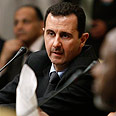
Assad says peace with Israel possible
Syrian President tells UAE daily normal relations with Jewish state will only be feasible if Israel ends its conflict with Palestinians. 'We give them the choice between comprehensive peace and a peace agreement which does not have any real value on the ground,' he states
Syrian President Bashar Assad said in an interview published on Monday that a peace deal with Israel was possible but that normal relations would only be possible if the Jewish state ended its conflict with the Palestinians.
"There will perhaps be an embassy and formalities, but if you want peace then it has to be comprehensive. We give them the choice between comprehensive peace and a peace agreement which does not have any real value on the ground," Assad was quoted as saying in the United Arab Emirates daily al-Khaleej.
"There is a difference between a peace agreement and peace itself. A peace agreement is a piece of paper you sign. This does not mean trade and normal relations, or borders, or otherwise," he said.
"Our people will not accept that, especially since there are half a million Palestinians in our country whose position remains unresolved. It is impossible under these terms to have peace in the natural sense."
As for negotiations with the new government soon to be formed in Israel, the Syrian president said he did not see any real difference between the Left and the Right in the Jewish state. However, he did not rule out the possibility of negotiating with Prime Minister-designate Benjamin Netanyahu's government.
"They're all the same. On the issue of rights there is no bad and worse. The rights must be returned to their owners. The Right is the Right and the Left is the Right. The Right kills Arabs and the Left kills Arabs and there's no value to all these references.
"When people talk to us about this issue we say there is a basis for the peace process, and whoever comes to Israel on this basis, we will negotiate with them. There is no value to the talks on the Right and the Left."
Syria and Israel held indirect talks last year under Turkish mediation. Talks focused on the Golan Heights which Israel captured in a 1967 Middle East war and on Syria's relationship with Iran, Hamas and the Lebanese Hizbullah group.
Syria is demanding that Israel commits to a withdrawal of Israeli troops from the Golan.
The indirect talks, put on hold due to the resignation of Prime Minister Ehud Olmert in September, were disrupted further after the recent Israeli war in Gaza.
US Senator John Kerry, chairman of the US Senate Foreign Relations Committee, said after a meeting with Assad in Damascus last month that Syria was prepared to resume the talks but wanted US participation.
Meeting? Only after full withdrawal
Asked about reports from before Israel's offensive in Gaza, that Jerusalem and Damascus had prepared for Turkish-mediated direct talks, Assad said, "The agreement on a meeting is not true. How are we supposed to jump to the end of the road when we have yet to finish the fundamental issues related to the direct negotiations, and particularly to the return of territory and to the signing of an agreement."
Assad said it was in the Palestinians' interests to coordinate with Damascus over its peace talks with Israel to avoid Israel putting off a resolution with the Palestinians.
"We believe that if Israel signs (a peace agreement) with Syria, Israel will put away the Palestinian question," he said.
As for the possibility of meeting with the Israeli prime minister, Assad said, "This meeting could only take place after a final agreement is signed and the withdrawal is carried out fully. Only then we'll be able to think about it, and we're not saying yes in advance."
He referred to the indirect Turkish-mediated talks as "feeling the pulse" and said this was done "due to our lack of trust in the Israeli government and as a result of the acts of aggression in Gaza and Lebanon."
During the indirect talks, he said, "We separated between drawing the borders and describing the borders. Drawing the line is the final thing, but describing it is the definition of several points.
"We chose six points in certain places, like Lake Kinneret and the Jordan River, in order to be convinced of how serious Israel was. Israel evaded this as usual and provided vague definitions."
Egypt was the first Arab country to sign a peace treaty with Israel but it is often described as a cold peace since relations extend little beyond official government contacts.
Reuters contributed to this report










